- Clone
- RM3/1 (See other available formats)
- Regulatory Status
- RUO
- Other Names
- GHI/61, M130, RM3/1, p155, Hemoglobin/haptoglobin complex receptor, Macrophage-associated antigen, ED2(rat), Macrophage marker
- Isotype
- Mouse IgG1, κ
- Ave. Rating
- Submit a Review
- Product Citations
- publications
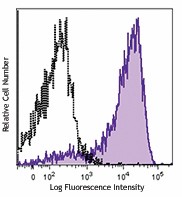
-

Human peripheral blood monocytes were incubated overnight with IL-10 and then stained with anti-human CD163 (clone RMA3/1) APC (filled histogram) or mouse IgG1, κ APC isotype control (open histogram).
| Cat # | Size | Price | Quantity Check Availability | Save | ||
|---|---|---|---|---|---|---|
| 326509 | 25 tests | 131 CHF | ||||
| 326510 | 100 tests | 303 CHF | ||||
CD163 is a member of the group B scavenger receptor cysteine-rich superfamily, also known as GHI/61, M130, RM3/1, p155, hemoglobin-haptoglobin complex receptor, or macrophage-associated antigen. It is a 134 kD (non-reduced)/155 kD (reduced) glycoprotein primarily expressed on macrophages, Kuffer cells, monocytes, subset of dendritic cells, and a subset of hematopoietic stem/progenitor cells. CD163 binds to haptoglobin-hemoglobin complex and TWEAK, and plays a role in clearing hemoglobin and regulating cytokine production by macrophages. Membrane CD163 can be cleaved by metalloproteinases (MMP), resulting in a soluble form. Elevated serum level of sCD163 has been implicated in many kinds of inflammation diseases.
Product DetailsProduct Details
- Verified Reactivity
- Human
- Antibody Type
- Monoclonal
- Host Species
- Mouse
- Immunogen
- Human monocytes
- Formulation
- Phosphate-buffered solution, pH 7.2, containing 0.09% sodium azide and BSA (origin USA)
- Preparation
- The antibody was purified by affinity chromatography and conjugated with APC under optimal conditions.
- Concentration
- Lot-specific (to obtain lot-specific concentration and expiration, please enter the lot number in our Certificate of Analysis online tool.)
- Storage & Handling
- The antibody solution should be stored undiluted between 2°C and 8°C, and protected from prolonged exposure to light. Do not freeze.
- Application
-
FC - Quality tested
- Recommended Usage
-
Each lot of this antibody is quality control tested by immunofluorescent staining with flow cytometric analysis. For flow cytometric staining, the suggested use of this reagent is 5 µl per million cells in 100 µl staining volume or 5 µl per 100 µl of whole blood.
- Excitation Laser
-
Red Laser (633 nm)
- Application Notes
-
Clone RM3/1 binds to domain 9 of CD163. Additional reported applications (for the relevant formats) include: immunofluorescence7.
-
Application References
(PubMed link indicates BioLegend citation) -
- Högger P, et al. 1998. J. Immunol. 161:1883. (FC)
- Zwadlo G, et al. 1987. Exp. Cell Biol. 55:295. (FC)
- Buechler C, et al. 2000. J. Leukoc. Biol. 67:97. (FC)
- Puig-Kroger A, et al. 2009. Cancer Res. 69:9395. (FC) PubMed
- Madsen M, et al. 2004. J. Biol. Chem. 279:51561. (FC)
- Jones K, et al. 2013. Clin Cancer Res. 19:731. (FC) PubMed
- Stewart DA, et al. 2012. Mol. Cancer Res. 10:727. (IF)
- Product Citations
-
- RRID
-
AB_2564014 (BioLegend Cat. No. 326509)
AB_2564015 (BioLegend Cat. No. 326510)
Antigen Details
- Structure
- 134 kD (non-reduced)/155 kD (reduced) glycoprotein, Scavenger receptor superfamily
- Distribution
- Monocytes, macrophages, Kuffer cells, subset of dendritic cells, subset of hematopoietic stem/progenitor cells
- Function
- Clearance of haptoglobin-hemoglobin complex, regulation of cytokine production by macrophages
- Ligand/Receptor
- Haptoglobin-hemoglobin complex, TWEAK
- Cell Type
- Monocytes, Macrophages, Dendritic cells, Hematopoietic stem and progenitors
- Biology Area
- Cell Biology, Immunology, Neuroscience, Neuroscience Cell Markers
- Molecular Family
- CD Molecules
- Antigen References
-
1. Roth J, et al. 1994. Transolantation. 57:127.
2. Van den Heuvel MM, et al.1999. J. Leukoc. Biol. 66:858.
3. Sulahian TH, et al. 2000. Cytokines 12:1312.
4. Fabriek BO, et al. 2007. J. Neuroimmunol. 187:179. - Gene ID
- 9332 View all products for this Gene ID
- UniProt
- View information about CD163 on UniProt.org
Related Pages & Pathways
Pages
Related FAQs
Other Formats
View All CD163 Reagents Request Custom Conjugation| Description | Clone | Applications |
|---|---|---|
| Purified anti-human CD163 | RM3/1 | FC,ICC |
| PE anti-human CD163 | RM3/1 | FC |
| Alexa Fluor® 647 anti-human CD163 | RM3/1 | FC |
| APC anti-human CD163 | RM3/1 | FC |
| PerCP/Cyanine5.5 anti-human CD163 | RM3/1 | FC |
| PE/Cyanine7 anti-human CD163 | RM3/1 | FC |
Customers Also Purchased
Compare Data Across All Formats
This data display is provided for general comparisons between formats.
Your actual data may vary due to variations in samples, target cells, instruments and their settings, staining conditions, and other factors.
If you need assistance with selecting the best format contact our expert technical support team.
-
Purified anti-human CD163
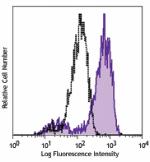
IL-10-stimulated (overnight) human peripheral blood monocyte... -
PE anti-human CD163
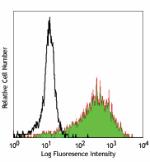
IL-10 stimulated human peripheral blood monocytes stained wi... -
Alexa Fluor® 647 anti-human CD163
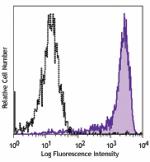
IL-10-stimulated (overnight) human peripheral blood monocyte... -
APC anti-human CD163
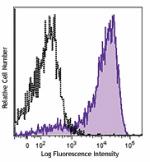
Human peripheral blood monocytes were incubated overnight wi... -
PerCP/Cyanine5.5 anti-human CD163
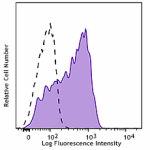
Human peripheral blood monocytes were incubated overnight wi... -
PE/Cyanine7 anti-human CD163
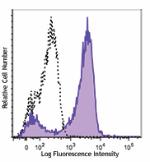
Human peripheral blood monocytes were incubated overnight wi...
 Login / Register
Login / Register 










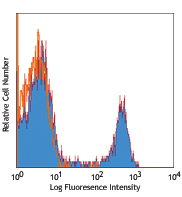
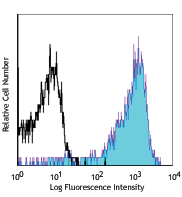
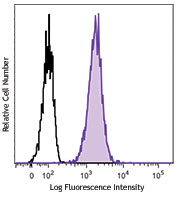
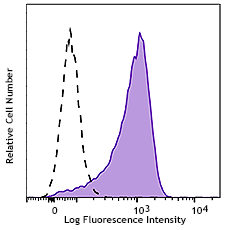



Follow Us